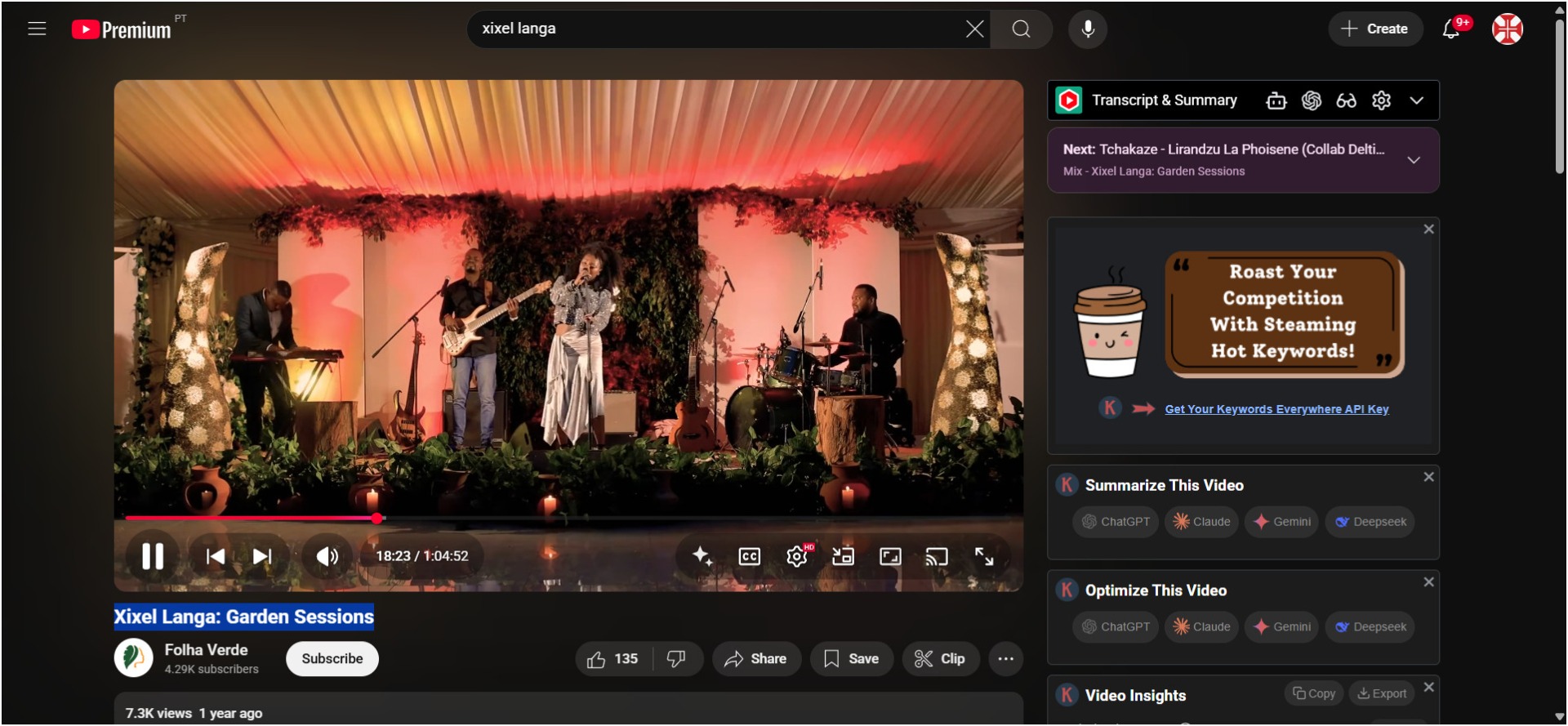mozambique music
Xixel Langa: Mozambique's Afro-Jazz Luminary and Cultural Bridge
In the heart of Mozambique's vibrant music scene, Xixel Langa stands as a beacon of cultural fusion and artistic resilience. Born Xisseve Janett Hortêncio Ernesto Langa into a legendary musical family in Maputo, Xixel has emerged as a multifaceted singer, songwriter, dancer, composer, and activist whose Afro-Jazz sound captivates audiences worldwide. With roots deeply embedded in traditional Mozambican rhythms like marrabenta and timbila, blended seamlessly with contemporary jazz, pop, and world music, Xixel's work not only entertains but also preserves and evolves her heritage. As of September 2025, her ethereal vocals and magnetic performances continue to bridge generations and continents, making her a pivotal figure in Lusophone African music.
A Musical Legacy Ignited Early
Xixel Langa's journey is steeped in family tradition. Her father, Hortêncio Langa, was a renowned musician and founder of the Mozambican Musicians' Association, while her mother, Yolanda Tajú, was a dancer. Uncles like Milagre Langa (of Orquestra Marrabenta) and Pedro Langa (of Ghorowane) further enriched her environment with sounds of Mozambique's soul. From a young age, Xixel immersed herself in this world, starting gymnastics and traditional dance at the National Dance School in Maputo in 1994. By her teens, she was singing in choirs like the Classical Music Project Xiquitsi, where she shone as a soprano soloist.
Her professional debut came at 19 in 2002, but early accolades arrived swiftly: Best New Talent in 2004 and Best Voice in 2005 at national awards. These honors propelled her into collaborations, including backing vocals for the band Kapa Dech in 2004, opening for Brazilian icon Gilberto Gil, and performing with South African legends Ray Phiri at the Nelspruit Jazz Festival. In 2005, she joined the Mozambique-Austria collaboration Projeto Noise and the South African Tucan-Tucan band in Cape Town, where she connected with Manding Kan's Ladji Kanté. Fronting the reggae band Mighty Vibration and performing with Timbila Muzimba honed her versatile style, influenced by family mentors like Stewart Sukuma and José Guimarães.
Fusion of Traditions: Xixel's Unique Sound
Xixel's music, often labeled "Pop-Afro-Jazz" or simply Afro-Jazz, is a masterful blend of jazz improvisation—drawing from Charlie Parker and Miles Davis—with Mozambican traditions like marrabenta, timbila, and xigubo. Singing in Tsonga, Shangaan, Portuguese, and English, her work creates danceable yet introspective tracks that explore personal and societal themes. Shaped by Mozambique's post-civil war challenges, Xixel describes music as her "uncomplicated" escape from a "complicated life," turning grief and resilience into art.
Her breakthrough single "Maputo" (2023) is a poignant homage to her hometown, capturing its "pulsating rhythm, culture, and flavors" as a "symphonic voyage" through the city's streets—where she was born, raised, and danced her first steps. This track exemplifies her ability to evoke joy and nostalgia while honoring her Gaza province roots. Her debut album, Vatekile (2023, meaning "taken" in Portuguese), is a melancholic masterpiece conceived five years earlier but reshaped by the COVID-19 pandemic and her father's passing. Mostly in Tsonga and Shangaan with touches of Portuguese and English, it parallels ancestral enslavement with personal loss, addressing job scarcity, grief, and perseverance amid "trying times."
Xixel's collaborations amplify her reach: features like "Ainda dá para sorrir" (with Puzzle and Zagalote), "Madimana," "Meu Caminho" (with Ivo De Jesus), "Vuma Txadile," "Kuntwala," and "Ntumbuluku" showcase her emotive range. She contributed to Portuguese jazz singer Maria João's 2023 album Abundância, harmonizing in the TP50 choir with Xizimba, Letícia Deozina, Nadya Cosmo, and Onésia Muholove, alongside Mozambican icons Mucavele and Stewart Sukuma, fusing timbila with electronic elements. Her music streams on Spotify, Apple Music, Deezer, SoundCloud (@xixellanga), and Shazam, with live clips on YouTube highlighting her dynamic energy.
Global Stages and Activism
Xixel's international presence is impressive, with performances in Brazil, China, France, Germany, India, South Africa, Taiwan, and at festivals like the Cape Town International Jazz Fest in 2019 (with Tiago Correia-Paulo and Richard Bona). Closer to home, she's graced venues like the Centro Cultural Franco Moçambicano, including her 2023 concert launching Vatekile. In a 2023 VOA Africa interview, she teased an upcoming album inspired by her late father, signaling her continued evolution.
Beyond the stage, Xixel is a dedicated activist. She's been an ambassador for campaigns against gender-based violence ("Fight against Violence to Women and Girls," 2014) and HIV/AIDS prevention (Johns Hopkins' "Dating several women is too risky"). Her educational impact includes technical singing support at the Cross Roads Academy of Music, mentoring at X-Hub Incubadora Artística, and advocating for musicians' rights as an ArtinDev ambassador (Music In Africa Foundation, 2022). In interviews, she stresses music's role in navigating Mozambique's "difficulties," where artists face frustration and instability, and credits her family for proving music as a dignified path.
Why Xixel Langa Matters
Xixel Langa is more than a musician; she's a cultural bridge, preserving Mozambique's traditions while innovating for global audiences. Her Afro-Jazz fusion embodies the "new sound" of Mozambican music, helping the industry evolve amid challenges. For fans of artists like Maria João or Thandiswa Mazwai, Xixel's discography—from "Maputo" to Vatekile—offers soulful, rhythmic journeys that resonate deeply. Stream her work on Spotify or follow @xixellanga on Instagram and Facebook for updates on tours and releases.
In 2025, as Mozambique's music scene gains momentum, Xixel remains a luminous force, using her voice to heal, inspire, and unite. Her legacy, like her family's, is one of enduring cultural pride and artistic excellence.
